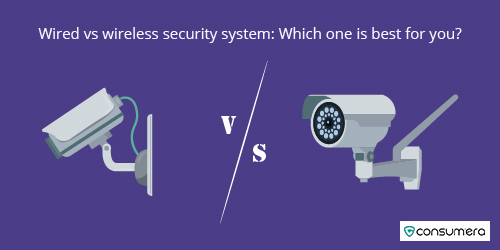With the increasing need for protection from break-ins, security systems are being installed more than ever. Having the best security system can make a big difference to your protection. But with the sheer number of systems to choose from can leave you overwhelming. If you are considering installing a security system, first, you have to choose between wired & wireless system. Both provide ample protection, but there are a few differences between them. Read through the article to have a detailed look at wired vs wireless security systems.

As the name suggests, it is a security system that uses a network of wires running across your home to send alerts to the control panel. In the wired security system, various components such as sensors, cameras, detectors, etc. are connected through visible wires. When someone trips the security system, the alarm sounds, and it sends the alert to the monitoring center via landline or sometimes through wireless communication.
This is one of the major advantages of wired security systems. These systems rely on telephone lines, making them less vulnerable to false alarms. Also, they are not susceptible to electromagnetic interference from devices, such as remote controls.
Hacking a wired security system is an arduous task. They require the hacker to connect to the system to make it malfunction. Given the effort, know-how, and time required, it’s highly unlikely it would be a target for hacking.
Maintaining the wired system is an easy process. Once installed, it will work consistently without needing to change batteries or devices. If you are moving into your new home, you can call the security provider to reconnect the system.
Installation of wired security systems requires professional help and drilling holes into walls to run low-voltage wires to sensors. This process can be costly, time-consuming, and challenging.
Usually, all wired security systems have a battery backup to account for power outages, but it lasts beyond the battery’s life, your system may shut down, leaving your home unprotected.
An intruder can easily disable the wired security system by snipping the telephone line, leaving you at risk of robbery.
Once installed, your wired security system remains there forever. Uninstalling them can be difficult, and hence the professionals do not recommend the process.
Wireless security systems work similarly to wired systems, but the significant difference is the absence of a network of wires. They leverage cellular networks to alert the monitoring authorities if the motion sensor or other detectors go off, and the alarm sounds.
Installing a wireless security system is easier as it doesn’t require drilling holes. In recent times, many wireless systems have a DIY install process, eliminating installation fees. They can also easily be uninstalled and transported to a new home.
Because they do not include wires, you add, move, and modify the system. Wireless security systems can also sync with home automation systems to enable smart locks, smart lights, and smart thermostats.
Wireless security systems can be monitored or controlled using mobile applications, eliminating the need for an in-home control pad.
Since they work on cellular networks, intruders cannot disable the system. Additionally, they are less susceptible to power outages as they operate on batteries.
Wireless security systems can be affected by electromagnetic interference, triggering frequent false alarms than a wired system.
Wireless systems that don’t have authenticated encrypted or signals can be hacked easily and enable burglars to enter your home undetected.
Wireless security system maintenance can be expensive. They run on batteries, and therefore the batteries need to be changed or charged periodically for uninterrupted functioning.
Both systems have pros and cons. What matters the most is your unique requirements and how the systems fulfill them.
Our top 3 picks

